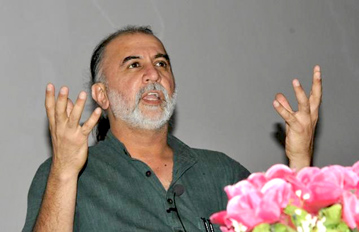 Panaji/New Delhi, Nov 22: The Goa government on Thursday ordered a suo motu "preliminary inquiry" into allegations that Tehelka's high-profile founder-editor and author Tarun Tejpal sexually assaulted a junior colleague in the lift of a starred hotel near the state capital of Panaji.
Panaji/New Delhi, Nov 22: The Goa government on Thursday ordered a suo motu "preliminary inquiry" into allegations that Tehelka's high-profile founder-editor and author Tarun Tejpal sexually assaulted a junior colleague in the lift of a starred hotel near the state capital of Panaji.
Briefing the media, chief minister Manohar Parrikar, who also holds the home portfolio, said that "a prima facie case has been made out" and didn't rule out summoning Tejpal, who has not been available for comment since the charges surfaced on Wednesday.
Goa DGP Kishan Kumar said the police have also asked the magazine's managing editor Shoma Chaudhury to hand over a copy of the complaint submitted to her by the victim "for necessary action". He said Chaudhury had not referred the matter to the police after receiving the complaint from the girl "as she was legally bound to do". "We cannot register an FIR based on media reports. We'll need a copy of the complaint," he added. Sources said the police have obtained video footage of the lift from the hotel management.
Tejpal had on Wednesday announced his decision to step down as editor of Tehelka for six months following the journalist's complaint to Chaudhury on November 18 alleging that while on duty she was sexually assaulted by Tejpal on two occasions on November 7 and 8 at the magazine's annual ThinkFest.
What provoked searing criticism was Tejpal's email to Chaudhury which stated that he was recusing himself from editorship as he "must do the penance that lacerates me". Kavita Krishnan, who heads the All India Progressive Women's Association (AIPWA), described Tehelka's response as "completely inadequate and in fact shocking. Penance is no substitute for due process and penalty." "Tarun Tejpal is no God to decide his own course of punishment," said Mamata Sharma, head of the National Commission for Women (NCW).
Chaudhury also came under fire on Thursday for her handling of the situation. She had told a TV channel, "There was an incident which has been dealt with internally. An unconditional apology was extended by Tarun. The journalist concerned was satisfied with the action taken." The journalist responded by saying, "I am deeply disappointed with Tehelka's response. The claim that I am 'satisfied' is false."
In her mail to Chaudhury, which details the two separate alleged incidents as well as everything that happened before and after, the journalist said, "Both times, I returned to my room in a completely distraught condition, trembling and crying.'' She said she had reported both incidents to three colleagues who were also in Goa for the festival. She said Tejpal later sent her text messages insinuating that she had "misconstrued'' the "drunken banter".
In an email to the magazine's staffers, Chaudhury had said: "There has been an untoward incident, and though he has extended an unconditional apology to the colleague involved, Tarun will be recusing himself as the editor of Tehelka for the next six months."
She attached an email from Tejpal which began, "The last few days have been most testing, and I squarely take the blame for this. A bad lapse of judgement, an awful misreading of the situation, have led to an unfortunate incident that rails against all we believe in and fight for."
When questioned about the incident, Shoma told The Indian Express: "I don't know how this concerns you...I don't think you can ask me these questions".
Facing flak for describing the case as an "internal matter", Chaudhury tried to defend her position by saying: "From my understanding she wanted an apology and it was given to her. The editor stepped down which was not something she had asked for, it was over and above that."
But when the criticism snowballed late Thursday, Chaudhury issued a statement saying Tehelka had now constituted a committee, as per Vishaka guidelines, headed by feminist and publisher Urvashi Butalia to investigate the matter.
At the press conference, chief minister Parikkar said that though Goa police could have filed an FIR, they had limited themselves to conducting a preliminary enquiry and the next course of action would depend on what this yielded.
Parrikar said action would be taken as per law. "Higher the person, higher the punishment should be, subject to the law. If in a high profile case, you do not punish the guilty, society will lose faith in institutions."
The victim has not submitted any complaint to the Goa police but Parrikar said that a preliminary enquiry does not need a complaint. "Also, a criminal offence within the jurisdiction of Goa necessitates that we investigate the charges regardless of whether a complaint is there or not," he added. The preliminary inquiry could take between anywhere one day to a week because the offence was committed about 10 days ago, he indicated.
Asked about the nature of the offence, Parrikar said that available information pointed towards attempted rape or molestation. Asked if he was depending only on media reports, Parrikar said the government had no knowledge of the offence beyond media reports.
The Goa state women's commission would also take cognizance of the offence and initiate suo motu action, he said. Commission chairperson Vidhya Shet Tanawade said the commission would meet on Friday to discuss the issue and decide on what needed to be done.





Comments
Add new comment